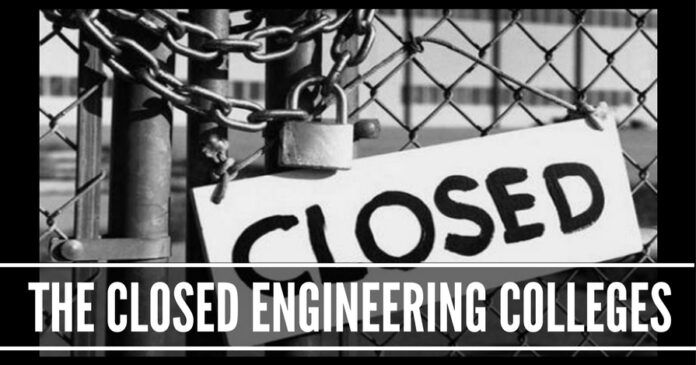
We can make ‘Closed down’ Engineering Colleges produce far more employable graduates than ‘Open Engineering Colleges’
India had less than 50 Engineering Colleges in 1947 and a little over 100 in 1965. Around the turn of the century, engineering education was opened up for privatization massively. There are about 3,500 engineering colleges today, but some of them are closing down for want of student enrolments, as there is a high % of unemployment and un-employability among the 4 lakhs engineering graduates passing out annually.
So, the policy of opening so many engineering colleges has often come in for criticism. Those who criticize may not be aware that, even in the 70s, there was a significant % of unemployment and un-employability among engineering graduates.
Today, there are excellent engineering graduates coming out of some good colleges, and some even from the ‘not so good’ (euphemistically called ‘Mata Pita’) engineering colleges; some of the choicest graduates get employed in good jobs abroad and in India, mostly in IT sector and MNCs.
It’s also true that a large percent of the engineering graduates are not employable (and/ or not employed), and some are grossly under-employed
Had engineering education not been opened up, most of these youth would have done B.Sc/ BA, and struggling for jobs today, competing for Government jobs even as clerks. It is just the opportunity space created by the engineering colleges that has helped them come up roaringly well in life.
Also, we used to have youth unrest due to reservations till the 90s, creating tensions among different castes, especially with lakhs of youth competing for the few thousand engineering seats. Opening up of engineering education meant that almost everyone who wanted got admission in some engineering college. This has completely squelched the tensions.
It’s also true that a large percent of the engineering graduates are not employable (and/ or not employed), and some are grossly under-employed. But without these private engineering colleges, we would have had heightened problem of unemployment, less GDP and nationwide unrest on the reservation.
The main reasons for the un-employability of these closing down Engineering Colleges are (i) dearth of good teachers to teach Engineering and (ii) lack of soft skills among these graduates, which is very much required in every aspect of business & industry today.
This article suggests how the infrastructure of these closed-down Engineering Colleges can be used effectively by the owners of these Colleges for their own good and in the best interest of the nation.
Many students who have undergone a fraction of such soft skills training programs are doing very well in their lives in senior positions in business & industry
Let’s look at the job scenario, not only in India but across the world. Older jobs are disappearing fast; newer ones coming up require specialized knowledge and skills (in realms like big data analytics, cyber security, environmental management, waste to wealth, investment, renewable energy, GST handling, CSR, etc.). The bad news is, more jobs are disappearing than new ones are getting created and even where new jobs are coming up, and there are very few competent candidates to fit these jobs.
There are also some ever-green generic jobs in sales across industry segments where openings are always available.
On a different note, entrepreneurial opportunities, especially localized small and micro-sized ones, are coming up (and are even invented and discovered) in just about every field. Such start-ups also require a sizeable number of open-minded employees with some kind of basic generic degree (or a degree-oriented towards business) and soft skills.
For almost all these jobs, the educational qualification requirement is a BBA, B. Com, or even a B. Sc, or B.A. But, these jobs also require soft skills, which most graduates don’t possess.
So, we are producing lakhs of engineering graduates who are unemployable, and there are lots of new jobs coming up for which competent candidates are not available.
If we can deliver reasonable quality degrees (like BBA, B.Com, or even B.Sc, or B.A), in day/ evening colleges, and also simultaneously, while at college, train the students in soft skills, we are more likely to make these graduates fit for these generic jobs like sales, and non-specialized jobs with start-ups.
Soft skills also imbibe in these graduates, the ability to learn, which means if these graduates lack in any specific knowledge or skills, they will be able to pick these up, either somewhere outside, or on the job. Many employers also train their recruits as long as they have the competence and commitment to learning.
If additional training programs in areas like big data analytics, cyber security, environmental management, waste to wealth, investment, renewable energy, GST handling, CSR, etc are given in these colleges alongside their degrees, these graduates with soft skills can also fit many of these new age jobs.
Some of the venturesome students can also be mentored to be entrepreneurs, availing the Government’s support schemes.
Standardized, tested and proven soft skills modules are available which can be easily delivered at college. Some trained facilitators are available in cities, esp down South. Some of the college teachers can also be quickly trained to be facilitators. A mere 1-2 hour training per day spread over any of the 3-year degree programs will be adequate to train the students in soft skills adequately, and even in one or two new age skills. With some additional inputs, such trainees can also be coached for diploma and certificate programs.
Many students who have undergone a fraction of such soft skills training programs are doing very well in their lives in senior positions in business & industry, and they will testify to the effectiveness of this soft skills training. So, this soft skills training is not new, though unfortunately, this has not become part of college education.
Such soft skills programs include training in communication skills (including sales skills), interpersonal skills, team skills, mental skills, social skills, etc, and develop self-esteem in the participants
If one of the closed-down Engineering Colleges (which have decent infrastructure) comes forward, this model can be implemented as ‘proof of concept’ after which this model can be implemented in the other closed down Engineering Colleges. In fact, just one year of implementation will reveal what a huge difference such a College can make to the life and career of the students; we may not even need the 3 full years for ‘proof of concept’, as the concept is already proven.
Such soft skills programs include training in communication skills (including sales skills), interpersonal skills, team skills, mental skills, social skills, etc, and develop self-esteem in the participants. They also include imbibing fairly strong principles & value systems, humaneness, ability to face adversities, etc., and could develop the participants into good leaders.
In fact, we can make ‘Closed down’ Engineering Colleges produce far more employable graduates than ‘Open Engineering Colleges’, at a lower cost. And this model will be eminently replicable. This model can address the problem of unemployment significantly.
Note:
1. The views expressed here are those of the author and do not necessarily represent or reflect the views of PGurus.
- How BJP can get 33%+ vote share in TN - April 1, 2024
- A transparent, equitable electoral funding alternative - March 19, 2024
- How TN BJP can come to No. 1 or No. 2 in 2024 LS polls - January 11, 2024











When is JNU being closed down?
Author,
Good idea and an equally good sentiment behind it. However, I am pessimistic because the quality of instruction is poor at best and colleges simply don’t know how to structure a soft skills course. For that matter, the same is true for hard skills courses too. You may recall that the VC of a prominent engg. university in TN said openly a couple of years ago that his students were unemployable. So, what needs to be done (although this may sound Thughlakian) is to train the soft skills instructors and course designers first. Let me give you an example. If you go to any major Metro in India, you’ll find institutes like Goethe Inst. teaching foreign languages. Compare the course design and the quality of instruction in these places to a college where Hindi is taught as a soft skill (in Chennai for example). The difference in standards is simply appalling. Everywhere I go, I see an instructor sometimes holding a microphone and shouting his notes into it, and 50+ students with their heads bent down, making notes faithfully.
If you require a Top Class, ‘Out of the World’ Soft Skills Training Course for any target group in South India at an extremely affordable fee, I will recommend an Organization that does it as a service, not for profit. Please contact me privately: ganesan@ezynes.com